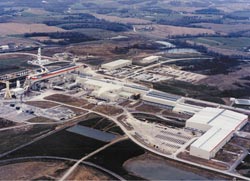Siemens installs drive system worth more than $10 million at steckel mill of SSAB in Montepelier, USA

Aerial view of SSAB's production site in Montpelier, Iowa, USA. Siemens supplied new drives for the plate and steckel mill. (Copyright: SSAB)<br>
“In addition to replacing obsolete parts related to the cycloconverter, SSAB wanted a more reliable motor and to reduce maintenance costs associated with the existing equipment,” said John Powell, SSAB facilities engineer, electrical and utilities. “Thus, SSAB replaced the motor and drives with a Siemens solution.
“The new Siemens drive system includes innovative software tools, including remote access diagnostic features, which significantly facilitate maintenance and documentation procedures. Siemens' local presence provides more readily available customer service, including spare parts and trained personnel. The power on the mill stands increases from 19 to 21 MW, giving SSAB headroom to improve their rolling operations even further.
“Siemens is certain that SSAB's new drive system will provide invaluable production, availability and service benefits,” said Aashish Gupta, vice president, Metals Technologies, Siemens Industry. “We are pleased to be able to continue our working relationship with SSAB.” Currently, Siemens is modernizing the continuous annealing line at SSAB's plant in Borlänge, Sweden, with new drives and automation.
SSAB is a global producer of high strength steels with a leading market position in quenched and tempered steels. SSAB Americas is the leading supplier of heavy plate and strip products in North America and Latin America. The plate and steckel mill at SSAB's integrated production site in Montpelier, Iowa is capable of producing 1.25 million tons of plate and coil per year. Steel is produced using a 150 ton electric arc furnace, treated in the adjacent secondary metallurgy facilities, before being cast to slabs in a single-strand continuous casting machine.
Further information about solutions for steel works, rolling mills and processing lines is available at http://www.siemens.com/metals
The Siemens Industry Sector (Erlangen, Germany) is the world's leading supplier of innovative and environmentally friendly products and solutions for industrial customers. With end-to-end automation technology and industrial software, solid vertical-market expertise, and technology-based services, the Sector enhances its customers' productivity, efficiency, and flexibility. With a global workforce of more than 100,000 employees, the Industry Sector comprises the Divisions Industry Automation, Drive Technologies and Customer Services as well as the Business Unit Metals Technologies. For more information, visit http://www.siemens.com/industry
The Metals Technologies Business Unit (Linz, Austria), part of the Siemens Industry Sector, is one of the world's leading life cycle partners for the metallurgical industry. The Business Unit offers a comprehensive technology, modernization, product and service portfolio as well as integrated automation and environmental solutions covering the entire lifecycle of plants. For more information, visit http://www.siemens.com/metals
Reference Number: IMT201204093e
Contact
Mr. Rainer Schulze
Metals Technologies
Siemens AG
Turmstr. 44
4031 Linz
Austria
Tel: +49 (9131) 7-44544
rainer.schulze@siemens.com
Media Contact
More Information:
http://www.siemens.comAll latest news from the category: Corporate News
Newest articles

Silicon Carbide Innovation Alliance to drive industrial-scale semiconductor work
Known for its ability to withstand extreme environments and high voltages, silicon carbide (SiC) is a semiconducting material made up of silicon and carbon atoms arranged into crystals that is…

New SPECT/CT technique shows impressive biomarker identification
…offers increased access for prostate cancer patients. A novel SPECT/CT acquisition method can accurately detect radiopharmaceutical biodistribution in a convenient manner for prostate cancer patients, opening the door for more…

How 3D printers can give robots a soft touch
Soft skin coverings and touch sensors have emerged as a promising feature for robots that are both safer and more intuitive for human interaction, but they are expensive and difficult…





















